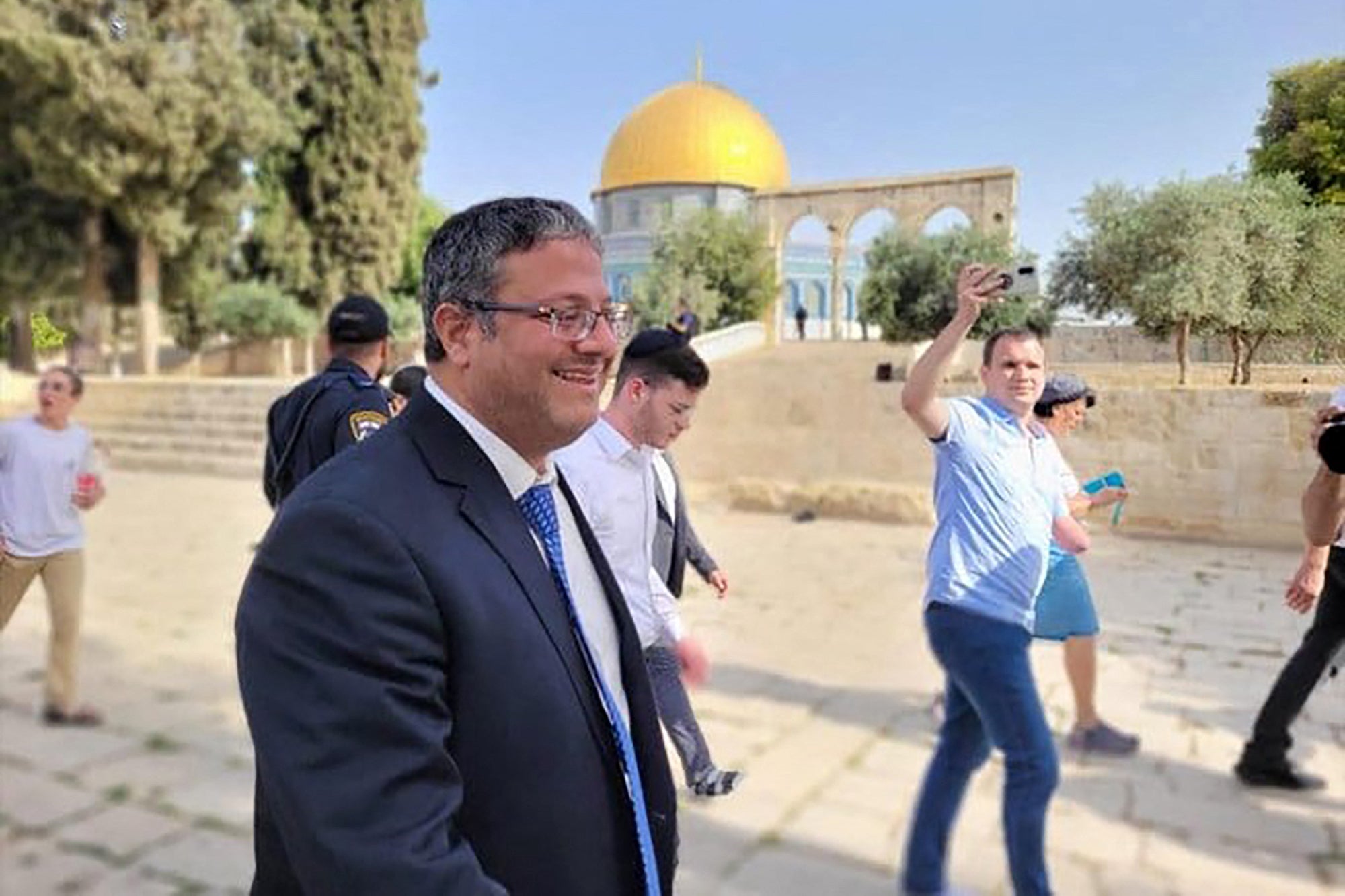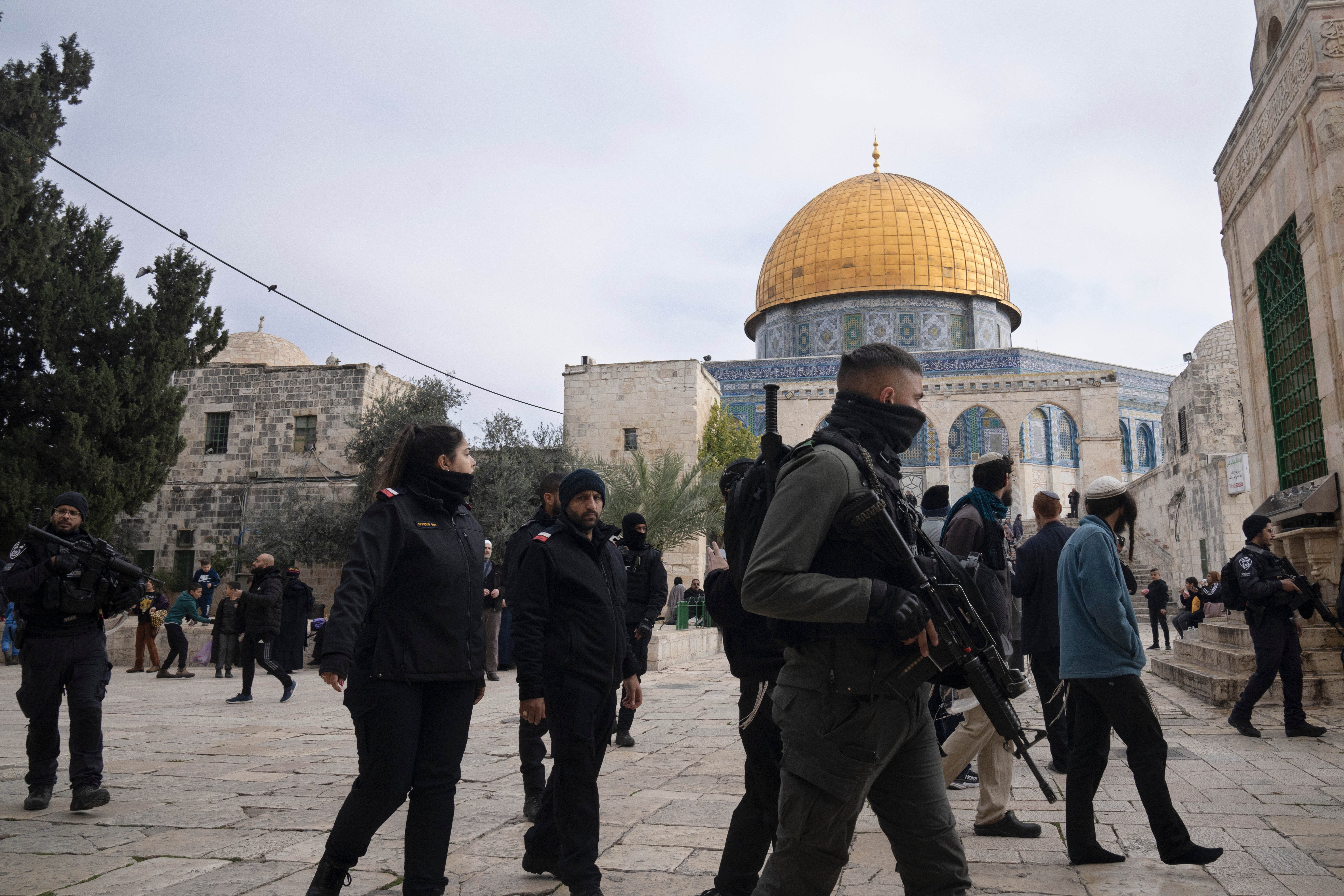US ambassador rebukes Israel over far-right minister’s visit to holy site
Attempts to change status quo at al-Aqsa mosque are ‘unacceptable’, says Tom Nides

Your support helps us to tell the story
From reproductive rights to climate change to Big Tech, The Independent is on the ground when the story is developing. Whether it's investigating the financials of Elon Musk's pro-Trump PAC or producing our latest documentary, 'The A Word', which shines a light on the American women fighting for reproductive rights, we know how important it is to parse out the facts from the messaging.
At such a critical moment in US history, we need reporters on the ground. Your donation allows us to keep sending journalists to speak to both sides of the story.
The Independent is trusted by Americans across the entire political spectrum. And unlike many other quality news outlets, we choose not to lock Americans out of our reporting and analysis with paywalls. We believe quality journalism should be available to everyone, paid for by those who can afford it.
Your support makes all the difference.Israel’s new far-right security minister visited a flashpoint Jerusalem holy site on Tuesday, drawing fierce condemnation from across the Muslim world and a strong rebuke from the United States.
Itamar Ben-Gvir, an unltra-nationalist supporter of illegal settlements in the West Bank, entered the site, known to Jews as the Temple Mount and to Muslims as the Noble Sanctuary, flanked by a large contingent of police officers. The site houses the al-Aqsa mosque.
“The Temple Mount is open to all,” Mr Ben-Gvir said on Twitter, using the Jewish name for the site.
Palestinian prime minister Mohammad Shtayyeh called on Palestinians to “confront the raids into al-Aqsa mosque”. He accused Mr Ben-Gvir of staging the visit as part of a bid to turn the shrine “into a Jewish temple”.
The leader of Lebanon’s powerful armed Hezbollah movement, Hassan Nasrallah, said that any infringement of the decades-long status quo at the al-Aqsa mosque in Jerusalem could lead to an explosion in the region, not just inside Palestinian territories.
Since Israel captured the site in 1967, Jews have been allowed to visit the site but not pray there. Palestinians consider the mosque a national symbol and view such visits as provocative and as a potential precursor to Israel seizing control over the compound. Mr Ben-Gvir once advocated ending the ban on Jewish prayer at the site, but has been more non-committal on the issue since aligning with Israel’s PM Benjamin Netanyahu.
Mr Netanyahu attempted to play down Mr Ben-Gvir’s visit, saying it was in line with longstanding practice at the site. But the incident unnerved enemies and allies that have expressed strong misgivings about the far-right makeup of his new government.
US ambassador Tom Nides said he had “been very clear” to Israel “on the issue of preserving the status quo in Jerusalem’s holy sites. Actions that prevent that are unacceptable”.
The United Arab Emirates, which established full diplomatic ties with Israel in 2020, called on Israel to “halt serious and provocative violations taking place there”.
Saudi Arabia condemned Mr Ben-Gvir’s action, as did statements from Kuwait and Qatar, while Turkey urged Israel to “to act responsibly”, saying such visits could “cause an escalation in the region”.
Jordan, which acts as custodian of the contested shrine, condemned Mr Ben-Gvir’s visit “in the strongest terms” and summoned Israel’s ambassador to lodge a protest.
Describing the Temple Mount as “the most important place for the Jewish people”, Mr Ben-Gvir decried what he called “racist discrimination” against Jewish visits to the site. With the Dome of the Rock in the background and waving his fingers at the camera, he said the visits would continue.
“The Israeli government won’t surrender to a murderous organisation, to a vile terrorist organisation,” he said in a video clip, in apparent reference to Hamas.
Tensions at the disputed compound have fuelled past rounds of violence. A visit by then-opposition leader Ariel Sharon in September 2000 helped spark clashes that became the second Palestinian uprising.

Hamas spokesperson Hazem Qassem said Mr Ben-Gvir’s visit was “a continuation of the Zionist’s occupation aggression on our sacred places and war on our Arab identity”.
Mr Netanyahu later insisted Israel remains committed to “strictly maintaining the status quo” at the site. He returned to office last week for his sixth term as prime minister, leading the most religious, right-wing government in the country’s history. Its goals include expanding illegal West Bank settlements and annexing the occupied territory.
Mr Ben-Gvir is head of the ultranationalist religious Jewish Power faction and has a history of inflammatory remarks and actions against Palestinians. He was once convicted of incitement and supporting a Jewish terrorist group, but in his new job now commands Israel’s police force.
On Monday, Israeli rights group B’Tselem said 2022 was the deadliest year for Palestinians since 2004. It said nearly 150 Palestinians were killed by Israeli fire in the West Bank and east Jerusalem.
Reuters and Associated Press contributed to this report
Join our commenting forum
Join thought-provoking conversations, follow other Independent readers and see their replies
Comments